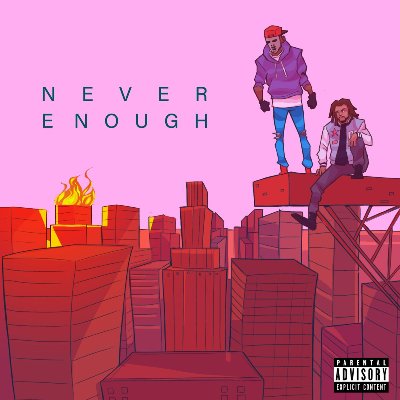Movies with underdogs at their centre will never go out of style because they bank on the audiences’ attachment to the trajectory of these main characters. Overcoming the odds will never be not admirable, and since humans are suckers for success stories, the portrayal of triumph, be it outright or clearly implied, at the end of these flicks not only provides some sort of utopian resolution, it also itches a collective spot of satisfaction. But since real life is a pot of beans and utopia can be a fraudulent concept, what happens when the underdog doesn’t become a conqueror?
Listening to Never Enough, the new 6-track entry by Boogey, the rapper’s seventh project and also his second this year, the recurring question on my mind bothered on how long Boogey would remain the underdog. If you need to be sold on Boogey’s ability in front of a mic, he has six, now seven projects as attestation. So why isn’t he getting the type of widespread props his talent and hard work should merit? In a terrain where English, lyric-driven rap gets none of the love and all of the hate, compounded with early label woes still weighing heavily on him, it’s as though Boogey is rolling a boulder up an incredibly steep hill – it’s a constant theme in his music and still dominant on Never Enough.
“Twice as gifted but never get half the cheese,” Boogey cries out on “Lazarus,” the fifth track on Never Enough, succinctly relating the improper fraction between skill level and remuneration, both tangible and intangible. “Lazarus” itself, propped up by a dancefloor-ready beat and a sublime hook by Boybreed, is without a doubt the best pop moment of Boogey’s career thus far, but instead of simply being lyrically lightweight as one might expect, he expertly bends the brightness back to fit in his usual fastidiousness, rattling off internal rhymes (“it’s the return of Battoussai the manslayer/pick a battle side, I got the enemy side praying”) and also imposingly proclaiming “I need y’all to believe I’m a god.” The conceit here is obvious, as it is on the other 100 tracks he’s dropped over the years in the same vein. But where does the all the kvetching lead up to, though? There are no new answers to that wearying, probably now archaic, question, and it’s why Never Enough is proof that the light-skinned wordsmith is hinged.
Earlier this year, Boogey released his proper debut LP Nouveau Niveau to critical acclaim. You’d expect a release with such implied significance, after five, prior free mixtapes to lead into something momentous, but the album was received the way most Nigerian indie hip-hop projects are received: hype and high praise on social media from those who pay attention to Nigerian hip-hop and then radio silence until one of those quotidian debates about hip-hop pops up. The price of constantly feeling overlooked, or worse still, having to endure backhand comments when you’re sure of your abilities, is that moving forward is a bigger hurdle than it should be. “I’m tired of this rap shit, depressing what it’s doing to my brain,” Boogey raps on the rumbling title track and opener of Never Enough, the type of lyric that could fit into many Boogey songs and a signifier that obstacles he’s facing are more than the successes he’s managed to accumulate.
In the words of the late great urban philosopher Dagrin, also one of Boogey’s top 5 Nigerian rappers, “ni life yi, won ni fun e gbogbo nkan to ba deserve.” Translating to English, the line reads “in this life, they won’t give you all that you deserve.” The complementary part to that quoted line is that it’s all about making lemonades out of those lemons. At this point in his career, and after so much time, as he says “polishing my craft,” Boogey should be making music that goes beyond complaining about lack of appreciation or even merely showcasing skill level. While Nouveau Niveau could count on vindictiveness as a driving force – see the Lady Donli assisted “Motions”, there’s a low stakes aura around Never Enough; it’s like watching the training montage of an underdog without the promise that it will ever cumulate into something bigger.
The good thing, though, about a supposedly low stakes project from a lyricist as gifted as Boogey is that it’s still very interesting to hear him rap; even if the music isn’t always perfect, he never fails to give up the lyrical goods. Despite the sleazy hook and rethreaded theme, there’s a strong technical presence to his raps on “Versus,” where you can tell he’s about to spring out a levelling one-liner but he’s still able to catch you off guard. On “The UNIVERSE Is A Big Baby,” Boogey’s world-building ability is on full display, using his seamless, first-person storytelling ability to vividly describe the timeline of a relationship doomed to end even before it starts.
Never Enough also works on a musical level thanks to masked producer Charlie X. Providing a diverse soundscape for Boogey to work with, CHx gives a varied feel to the project, and also provides the pop instinct that his partner obviously lacks. It doesn’t always work – “Queen,” the obligatory girl record, is the least sexy Caribbean song I’ve heard in a minute – but when it does, a potential hit single like “Lazarus” is what ensues.
The project ends on a high with “Running,” featuring show-stopping, Dido-esque falsetto singing by Tetta and a resplendent, percussive afro-soul beat. On his lone, short verse, Boogey, while still world-weary, is at his most humane, shedding the complexities of obstacles for the intricacies of his ambitions. The wistfulness on “Running” does more in showing and endearing Boogey’s tenacity than the sideways anguish that’s primary to other songs Never Enough. Hopefully, this reflective approach permeates his releases from now on because, in its exhaustiveness, nothing is ever enough when anger is the strongest driving force.


